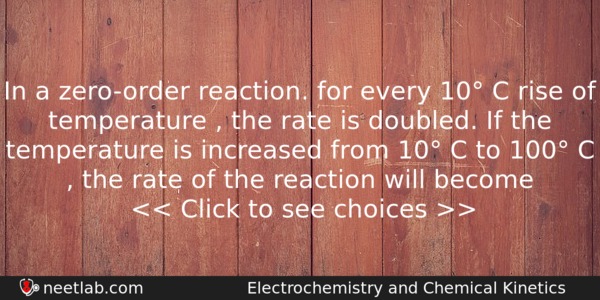| ⇦ | 
| ⇨ |
In a zero-order reaction. for every 10° C rise of temperature , the rate is doubled. If the temperature is increased from 10° C to 100° C , the rate of the reaction will become
Options
(a) 256 times
(b) 512 times
(c) 64 times
(d) 128 times
Correct Answer:
512 times
Explanation:
No explanation available. Be the first to write the explanation for this question by commenting below.
Related Questions: - Polyethylene is a resin obtained by polymerization of
- In the titration of strong acid and weak base, the indicator used is
- In the case of alkali metals, the covalent character decreases in the order
- What is the mole fraction of the solute in a 1.00 m aqueous solution?
- A real gas most closely approaches the behaviour of an ideal gas at
Topics: Electrochemistry and Chemical Kinetics
(87)
Subject: Chemistry
(2512)
Important MCQs Based on Medical Entrance Examinations To Improve Your NEET Score
- Polyethylene is a resin obtained by polymerization of
- In the titration of strong acid and weak base, the indicator used is
- In the case of alkali metals, the covalent character decreases in the order
- What is the mole fraction of the solute in a 1.00 m aqueous solution?
- A real gas most closely approaches the behaviour of an ideal gas at
Topics: Electrochemistry and Chemical Kinetics (87)
Subject: Chemistry (2512)
Important MCQs Based on Medical Entrance Examinations To Improve Your NEET Score
18000+ students are using NEETLab to improve their score. What about you?
Solve Previous Year MCQs, Mock Tests, Topicwise Practice Tests, Identify Weak Topics, Formula Flash cards and much more is available in NEETLab Android App to improve your NEET score.
Share this page with your friends

Leave a Reply